 The poster headlined 'Long live the elderly!' is subtitled 'Preventing the Social Isolation of the Elderly Popuelation'.
Pope addresses his 'fellow elderly'
The poster headlined 'Long live the elderly!' is subtitled 'Preventing the Social Isolation of the Elderly Popuelation'.
Pope addresses his 'fellow elderly'
at Sant'Egidio Community home

Nov. 12, 2012

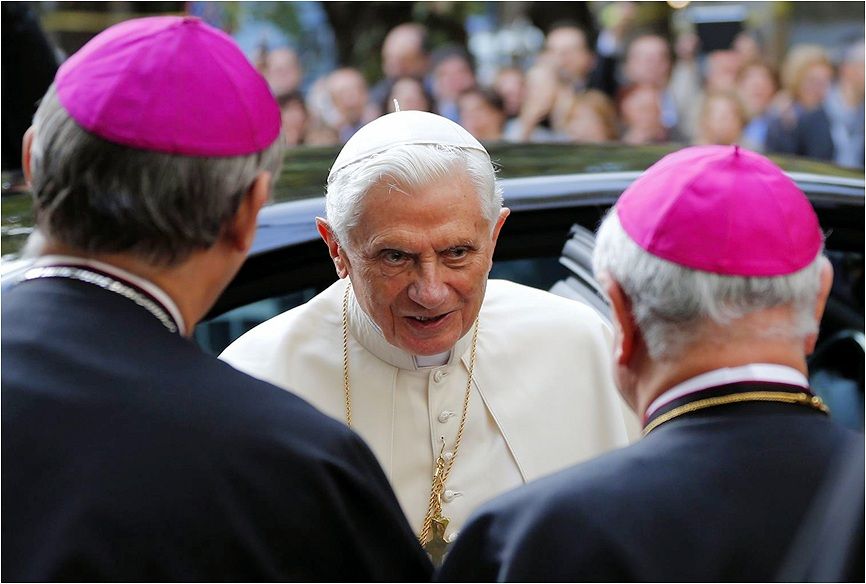
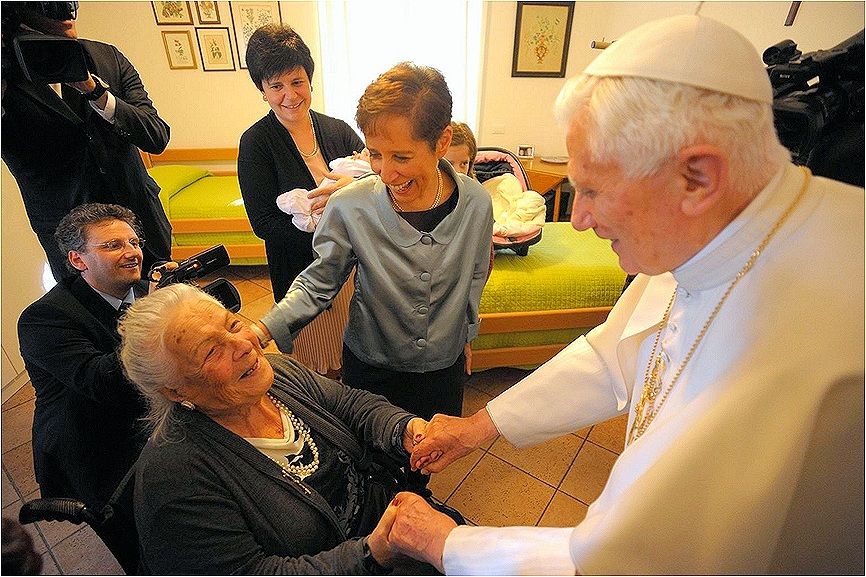
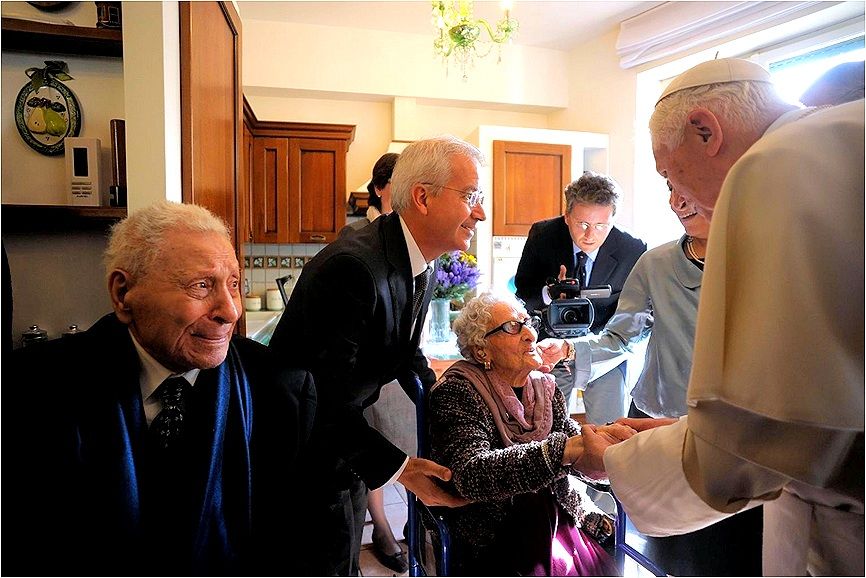
“The quality of a society, I would say of a civilization, is judged by how well older people are treated and the place reserved for them in community life. Whoever makes room for the elderly makes room for life! Whoever welcomes the elderly welcomes life! ", affirmed Pope Benedict XVI during a visit Monday morning to the Community of Sant'Egidio's home for the elderly on the Janiculum Hill, Rome.
Emer McCarthy reports:
The Holy Father was warmly welcomed by the residents and he began by addressing them as his “peers”. Referring to the current European Year for Active Aging and Solidarity between Generations, the Pope said that "the elderly are a value to society, especially for young people. There can be no true human growth and education without a fertile contact with the elderly, because their very existence is like an open book in which the younger generation can find valuable guidance for life’s journey".
However he noted that “often, society, dominated by the logic of efficiency and profit, does not accept it as such, and indeed often rejects it, considering older people as unproductive, useless. Many times you hear the suffering of those who are marginalized and living far from home or in solitude. I think there should be a greater commitment, starting from families and public institutions, to ensure that older people can stay in their homes. The wisdom of life which they bear is a great wealth.”
Despite this, the Pope said “even "when life becomes fragile, in old age, it never loses its value and dignity, each one of us, at any stage of existence, is wanted, loved by God, everyone is important and necessary".
"This phase of life", he concluded, "is also a gift to deepen our relationship with God. The example of Blessed John Paul II was and still is enlightening for everyone. Do not forget that among the valuable resources that you have is the essence of prayer: become intercessors to God, praying with faith and constancy. Pray for the Church, for me, for the needs of the world, for the poor, so that there may be no more in the world. The prayer of the elderly can protect the world, perhaps helping it in a more incisive way than the toil of many. Today I would like to entrust to your prayers the good of the Church and world peace."
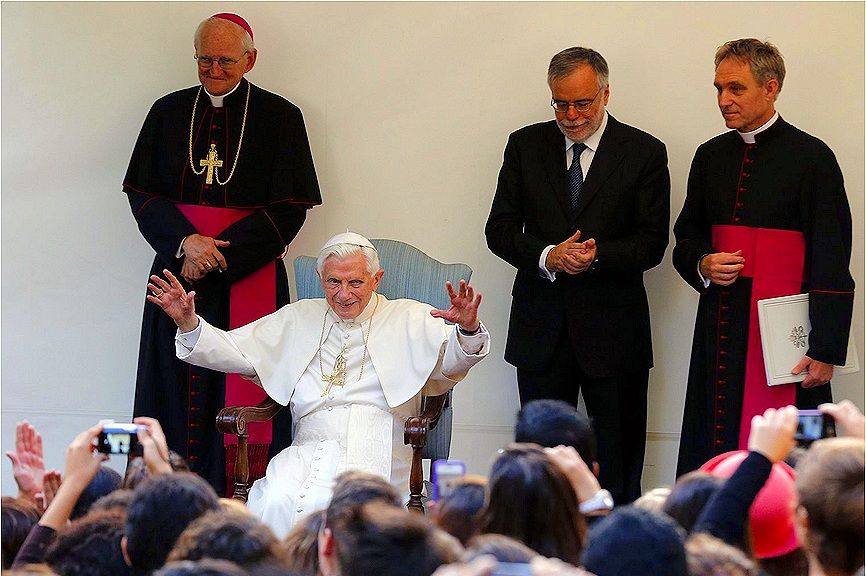
Here is a translation of the Holy father's address:
Dear brothers and dear sisters,
I am truly happy to be with you in this 'family home' of the Sant'Egidio Community that is dedicated to the elderly. I thank your president, Prof.Marco Impagliazzo, for the warm words he addressed to me. Along with him, I greet Prof. Andrea Riccardi, founder of the community.
And for their presence here today, I thank the Auxiliary Bishop for the historic center of Rome, Mons. Matteo Zuppi; the president of the Pontifical Council for the Family, Mons. Vincenzo Paglia' and all the friends of the St. Egidio Community.
I come to you as Bishop of Rome, but also as an elderly person visiting his contemporaries. It is superfluous to say that I know very well the difficulties, the problems and the limitations of advanced age, and I know that for many, these difficulties are aggravated by the economic crisis.
Sometimes, at a certain age, one turns to recall the past, lamenting the time when one was young, enjoyed fresh energies, and made plans for the future. That is why looking back is sometimes veiled in sadness, as one considers this present phase in life as a time of decline.
This morning, addressing myself to all elderly people, and even in the awareness of the difficulties that our age implies, I wish to tell you with profound conviction - it is beautiful to be old.
At every age, one must know how to discover the presence and the blessings of the Lord, and the richness deriving from him. One must never be imprisoned by sadness. We have received the gift of long life. Life is beautiful even at our age, notwithstanding the inevitable infirmities and limitations. On our faces, may there always be, not sadness, but the joy of feeling ourselves loved by God.
In the Bible, longevity is considered a blessing of God. Today, this blessing is widespread and must be seen as a gift to be appreciated and valued. And yet, society, dominated by the logic of efficiency and of profit, often does not welcome it as such.Rather, it often rejects old age, considering the elderly as unproductive and useless.
So many times, we sense the suffering of those who are marginalized, who live away from their own homes, and in solitude. I think that there should be a greater effort, starting with families and public institutions, to do all that is possible so that elderly people may remain in their own homes.
The wisdom of life that we carry as older people is a great wealth. The quality of a society - and I would say, of a civilization - can also be judged by how elerly people are treated and for the place reserved for them in the common good. Those who make room for the elderly make room for life. Those who welcome the elderly welcome life.
Te Sant'Egidio Community, from its beginnings, has sustained many elderly people along the way, helping them to remain in their respective life surroundings by opening various 'family homes' in Rome and around the world.
Through solidarity between young people and the elderly, it has helped to make clear that the Church is effectively the family for all generations, in which everyone must feel 'at home' and where it is not the logic of profit and possession that reigns but that of love and giving freely.
Even when life becomes fragile in old age, it never loses its value and dignity. Each of u, at whatever stage of existence, is wanted and loved by God. Each of us is important and necessary. [Homily at the start of Benedict XVI's Petrine Ministry, April 24, 2005).
My visit today takes place during the European Year for Active Aging and of Solidarity among Generations. It is in this context that I wish to reiterate that elderly people are valuable to society, especially for the young. There can be no true human growth and education unless there is fruitful contact with the elderly, because their very existence is like an open book in which the younger generations can find valuable directions for the journey of life.
Dear friends, at our age, we often experience the need of assistance from others - this too happens for the Pope. In the Gospel we read that Jesus tells Peter, "When you were younger, you used to dress yourself and go where you wanted; but when you grow old, you will stretch out your hands, and someone else will dress you and lead you where you do not want to go" (Jn 21,18).
The Lord was referring to the way in which the Apostle would bear witness to his faith to the point of martyrdom. But it also makes us reflect on the fact that the need for assistance is a condition for the elderly. I invite you to look at this likewise as a gift from the Lord because it is a grace to be sustained and accompanied by others, to feel their affection!
This is important in every phase of life: no one can live alone and without assistance. The human being is relational. And in this home, I note with pleasure that those who help and those who are being helped form one family whose lifeblood is love.
Dear elderly brothers and sisters, sometimes the days may seem long and empty, with difficulties but few commitments and encounters. Never be discouraged: You are a richness for society,even in suffering and sickness. Moreover, this phase of life is also a gift that enables us to deepen our relationship with God.
The example of Blessed John Paul II was and continues to be illuminating for everyone. Do not forget that among the precious resources you have is the essential one of prayer. Become intercessors before God, [praying with faith and constancy.
Pray for the Church, including myself, for the needs of the world, for the poor, and for an end to violence in this world.
The prayers of the elderly can protect the world, perhaps even helping more decisively than the efforts of many. I wish to entrust to your prayers the good of the Church and peace in the world.
The Pope loves you and counts on all of you! You must feel loved by God, and bring to our society - that is often so individualistic and efficiency-driven - a ray of God's love. God will always be with you and those who sustain you with their affection and assistance.
I entrust you all to the maternal intercession of the Virgin Mary, who will always accompany our journey with her maternal love, and I gladly impart to each and everyone my blessing. Thank you to everyone!
After the address, the Pope unveiled and blessed a marker to commemorate the visit. After greeting the youth community of Sant'Egidio, he returned to the Vatican.
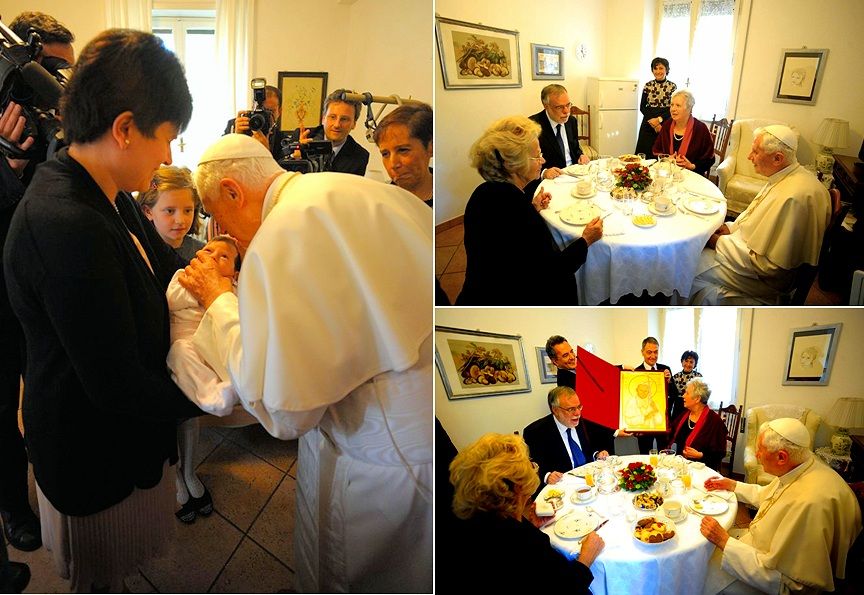
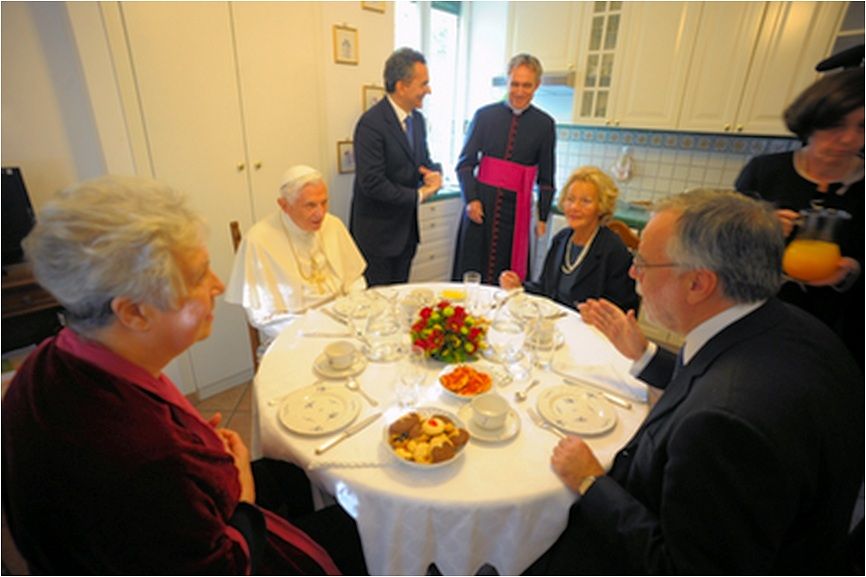
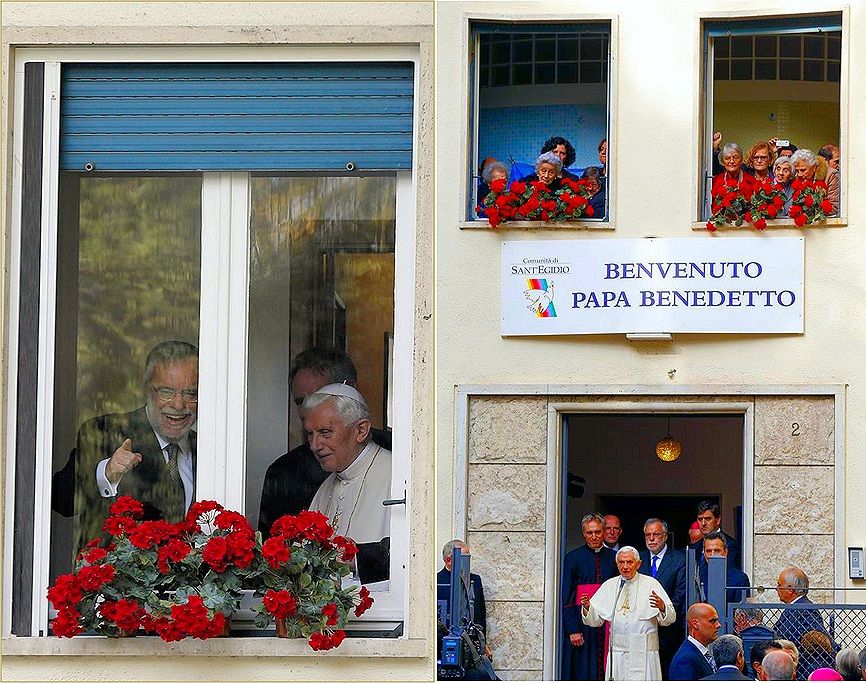 A backgrounder from Sant'Egidio
A backgrounder from Sant'Egidio
The Pope has chosen to visit an innovative experience in the field of services for the aged, part of a 30-year-long effort on the part of the Community of Sant’Egidio to improve the condition of the elderly in Rome and in the world on the occasion of the European Year of Active Aging and of Solidarity Between Generations. A special occasion. For a global message which satisfies a profound need of our times.
The Pope first met with some elderly Haitian refugees and a delegation from the Community of Sant’Egidio. He then proceeded to the home for both self-sufficient and not self-sufficient people, on the top floor, which represents a model for family-like assistance and health care 24 hours a day.
Afterwards, he visited the elderly residents of the mini-apartments of the structure, who have the benefit of common services and, when necessary, the care furnished in the rest of the Home.
The Pope then addressed all the residents in the garden of the home; it was broadcast on a large screen to the crowd outside the building.
The home visited by the Pope was inaugurated in January 2009 and now accommodates 28 seniors, is a particularly successful expression of a housing arrangement that combines a family home (for non self-sufficient guests as well) with a protected condominium. Thus the guests of the studio apartments can have, aside from other services, a permanent relationship with the care-givers of the family home on duty 24 hours a day.
The Community of Sant’Egidio has been close to the elderly population since the beginning, in the 1970s, attending to them in the outer suburbs as well as the center of Rome. The seniors appeared to be sick of loneliness, asking for company and support. The friendship has continued through the years with loyalty, not only in Rome and the rest of Italy, but in all countries in the North and South of the world where the Community is present.
Today in Rome, service to the elderly reaches 18,000 people, cared for by 800 volunteers. There are also 100 small communities of solidarity and friendship among the elderly. The elderly, with their prayers, represent a strong source of support for the Church and all of the people who are suffering.
All over the world the number of elderly people is on the rise, but their longevity, in many parts of the world, is viewed with growing concern, to the point of taking on the form of a virtual generational conflict.
“Reconciliation” between different generations is needed: youth and adults need the elderly and vice versa. A society that has no room for the elderly is inhuman. That is why the Community in Rome involves hundreds of teenagers and young adults in meetings with the elderly, including visits to the institutes where many older people live.
These meetings help the youth discover that longevity is one of the best results of our times and help the elderly understand that there is a place for them in our society because they still have a lot to give in terms of affection, friendship and a sense of life.
Helping the elderly to live at home
In large cities, isolation, the diminishing size of households and the elevated cost of rent all contribute to the estrangement of the eldest at the first sign of difficulty. Institutionalizing seniors sometimes appears to be the only possible and reasonable solution, but it is an arrangement that in many cases does not respect the desire of the elderly, who suffer from separation from the family environment, the objects and the memories of their homes.
An important aspect of the Community’s effort consists in supporting the families of the elderly, which often find themselves unprepared and disoriented in the face of disease and of the loss of independence on the part of older relatives.
Another important part of the service is building a network of relationships for seniors with neighbours, friends and the local parish, all resources for the ability to continue living at home. It is a service of monitoring and preventing emergencies - like heat waves, intense cold spells, falling down – and of strengthening the support system.
These efforts reach all residents over 75 in the Trastevere, Testaccio and Esquilino districts and involve in the so-called “network of proximity” over 600 volunteers, doctors, doormen, shop keepers, neighbours and family care-givers. This way social isolation is lessened to a large degree.
Statistics show a lower mortality rate in the senior populations of these three Roman neighbourhoods, thus proving that at home you live better and longer.
Living in a geriatric structure often means experiencing isolation and abandonment, which lessens the desire to live. The mortality rate is in fact four times higher in such institutions. The Community of Sant’Egidio is present in hundreds of institutional homes for the aged in Italy, Europe and on other continents with a service of companionship, animation and pastoral care.
Friendly and assiduous companionship helps the elderly maintain relations with the outside world and preserve the integrity of their personality. The presence of the Community in the institutes for the aged provides a stimulus and incentive for these structures to perform their jobs better.
New living arrangements proposed by the Community of Sant’Egidio
Staying at home is impossible for some seniors because of reduced autonomy, the loss of lodging because of family quarrels and economic hardship.
In this perspective, in order to reduce the number of admissions to mega-structures, the Community has implemented a number of alternative solutions, like experiences in co-housing which, in time, have paved the way for an articulated model for responding to the housing needs of the senior population: co-habitation, protected condominiums, family-like homes. In Rome alone there are more than 300 seniors housed in these various types of living arrangements.
There are seniors who are alone and have a home but do not have their health and are no longer completely self-sufficient, others who have a pension income but cannot afford the rent for an apartment, others that enjoy good health but are devoid of financial means. The Community of Sant’Egidio helps to get them together and accompanies them on the road to cohabitation, thereby enabling them to avoid inevitable institutionalization.
The elderly pool their economic and housing resources, living in homes that assure better living conditions. The homes are located in the center of the city, not far from the things that seniors need: stores, fresh markets, churches. These experiences receive the aid of younger members of the Community.
They also represent an occasion for cooperation and integration between generations. Such ventures have expanded in the last two years in Rome in order to respond to worsening economic conditions in several different sections of the city, from Ostia to Tufello, from Garbatella to Torrenova. 150 seniors are cared for this way.
There are entire buildings of studio apartments (40-60 square meters each) for one or two people, which are devoted to seniors who are self-sufficient but fragile from a housing point of view (homeless, evicted or completely alone). The guests are offered common services and support for problems of daily living. It is a way of continuing to live at home, with protection. More than 100 seniors are accommodated in Community protected condominiums.
Structures for seniors with reduced autonomy who can no longer stay home for a lack of housing, sufficient economic resources or meaningful inter-personal relations. The seniors live in a family-like home, furnished with taste: the guests are encouraged to bring their own furniture. The absence of architectural barriers and the presence of numerous auxiliaries help preserve autonomy.
Above all, these homes offer a humane relational life made up of exchanges with other generations, like a re-constituted family. They restore a sense of life and at the same time assure high-quality care. These family homes accommodate 50 seniors in Rome.
[Modificato da TERESA BENEDETTA 13/11/2012 06:31]